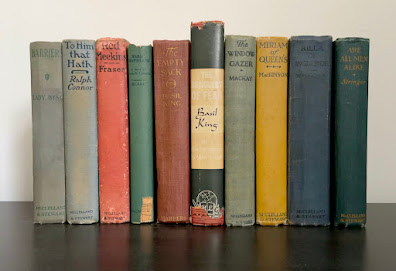 |
| The Globe, 3 December 1921 |
The 1921 edition of 'Recent Books and the Outlook,' the Globe's annual list of best books, begins on a positive note: "Author's and publishers have had an unhappy experience during the past few years owing to conditions which they could not control, but the current season has a distinctly better tone."
The Great War must surely have ranked as the preeminent condition. There were years in which the conflict came close to dominating 'Recent Books and the Outlook.' The 1920 edition had an entire section devoted to books about the war:
Not only is the Great War barely mentioned in the 1921 'Recent Books and the Outlook,' just three of its 206 books are related to the bloodshed just twenty-four months past. Great War poetry disappears entirely... and with it poetry. I exaggerate, but only slightly. Eight volumes of verse are listed, down from nineteen the previous year; four are Canadian:
My Pocket Beryl - Mary Josephine BensonLater Poems - Bliss CarmanBill Boram: A Ballad - Robert NorwoodBeauty and Life - Duncan Campbell Scott
I'm not familiar with any of these titles, but have read and reviewed Robert Service's 1921 Ballads of a Bohemian. To this point, the Bard of the Yukon had been a 'Recent Books and the Outlook' favourite;' I'd thought Ballads of a Bohemian a shoo-in. Is Bill Boram: A Ballad so much better? I must investigate.
As in years past, fiction makes up the biggest category; their number is seventy-two, the star being If Winter Comes by A.S.M. Hutchinson:
Hutchinson's achievement aside, the Globe is disappointed by foreign offerings:
Fiction in other countries has been disappointing during the last year, and has certainly not proved as rich as biography or history. American readers fall into two classes says the New York Times Book Review, those who like John Dos Passos' "The Three Soldiers" and those who do not.The correct title is Three Soldiers.
It doesn't make the list.
 |
| My copy (New York: Doran, 1921) |
Where foreign writers of fiction disappoint, Canadians flourish. A record twenty-four Canadian fiction titles figure. Or is it twenty-three? Twenty-two?
The Lone Trail - Luke AllanAnne of the Marshland - Lady ByngBarriers - Lady ByngTo Him That Hath - Ralph ConnorThe Lobstick Trail - Douglas DurkinThe Gift of the Gods - Pearl FoleyRed Meekins - W.A. FraserMaria Chapdelaine - Louis Hemon [trans W.H. Blake]Maria Chapdelaine - Louis Hemon [trans Andrew Macphail]The Quest of Alistair - Robert A. HoodThe Hickory Stick - Nina Moore JamiesonLittle Miss Melody - Marian KeithThe Conquest of Fear - Basil KingPartner of Chance - H.H. KnibbsThe Snowshoe Trail - Edison MarshallPurple Springs - Nellie McClungRilla of Ingleside - L.M. MontgomeryAre All Men Alike? - Arthur StringerThe Spoilers of the Valley - Robert Watson
Let's ignore the misspelling of Isabel Ecclestone Mackay's surname, shall we. Louis Hémon's, too. Interesting to see both Maria Chapdelaine translations, don't you think? What really intrigues is the inclusion of Basil King's The Conquest of Fear.
As my 1942 World Library edition (above) suggests, The Conquest of Fear is a work of philosophy. The Globe describes it at a novel:
The inclusion of Arthur Stringer's Are All Men Alike? is just as intriguing. The author published two books in 1921, the other being his heart-breaking roman à clef The Wine of Life. By far the finest Stringer I've read thus far, my dream is to one day bring out an edition featuring the twenty-four James Montgomery Flagg illustrations it inspired.
Is Are All Men Alike? superior to The Wine of Life?
I haven't read it, nor have I read Jess of the Rebel Trail or Little Miss Melody. I have read Miriam of Queen's and The Window Gazer, both of which disappointed. The Empty Sack is my very favourite Basil King title, and yet it too pales beside The Wine of Life.
I haven't read it, nor have I read Jess of the Rebel Trail or Little Miss Melody. I have read Miriam of Queen's and The Window Gazer, both of which disappointed. The Empty Sack is my very favourite Basil King title, and yet it too pales beside The Wine of Life.
Or is it better? Are they all better?
What do I know? I think Three Soldiers is the best novel of 1921.
Yes, I'm one of those who like it.
What do I know? I think Three Soldiers is the best novel of 1921.
Yes, I'm one of those who like it.
Related posts:























